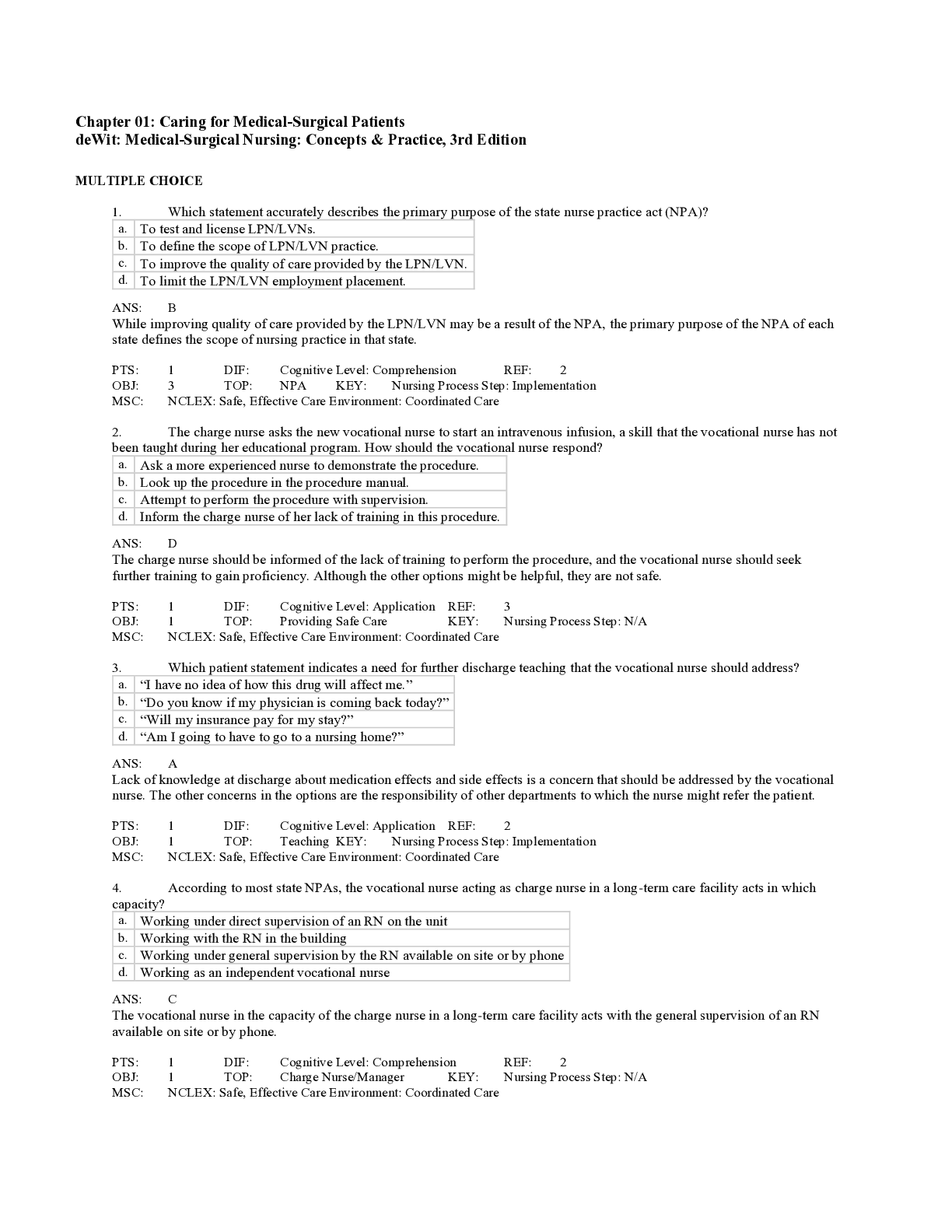*NURSING > MED-SURG EXAM > Test Bank Medical Surgical Nursing 11th Edition Newest,Latest 2025/2026 with VERIFIED Answers A+ (All)
Test Bank Medical Surgical Nursing 11th Edition Newest,Latest 2025/2026 with VERIFIED Answers A+
Document Content and Description Below
Chapter 17: Preoperative Care Harding: Lewis’s Medical-Surgical Nursing, 11th Edition MULTIPLE CHOICE 1. A patient scheduled for an elective hysterectomy tells the nurse, “I am afraid that I w... ill die in surgery like my mother did!” Which initial response by the nurse is most appropriate? a. “Tell me more about what happened to your mother.” b. “Surgical techniques have improved in recent years.” c. “You will receive medication to reduce your anxiety.” d. “You should talk to the doctor again about the surgery.” ANS: A The patient’s statement may indicate an unusually high anxiety level or a family history of problems such as malignant hyperthermia, which will require precautions during surgery. The other statements may also address the patient’s concerns, but further assessment is needed first. DIF: Cognitive Level: Analyze (analysis) TOP: Nursing Process: Assessment MSC: NCLEX: Psychosocial Integrity 2. A patient arrives at the outpatient surgical center for a scheduled laparoscopy under general anesthesia. Which information requires the nurse’s preoperative intervention to maintain patient safety? a. The patient has never had general anesthesia. b. The patient is planning to drive home after surgery. c. The patient drank a sip of water 4 hours before arriving. d. The patient’s insurance does not cover outpatient surgery. ANS: B After outpatient surgery, the patient should not drive that day and will need assistance with transportation and home care. Clear liquids only require a minimum preoperative fasting period of 2 hours. The patient’s experience with anesthesia and the patient’s insurance coverage are important to establish, but these are not safety issues. DIF: Cognitive Level: Apply (application) TOP: Nursing Process: Assessment MSC: NCLEX: Safe and Effective Care Environment 3. A 38-yr-old woman is admitted for an elective surgical procedure. Which information obtained by the nurse during the preoperative assessment must be communicated to the anesthesiologist and surgeon before surgery? a. The patient’s lack of knowledge about postoperative pain control b. The patient’s history of an infection following a cholecystectomy c. The patient’s report that her last menstrual period was 8 weeks ago d. The patient’s concern about being able to resume lifting heavy items ANS: C NURSINGTB.COM Lewis's Medical Surgical Nursing 11th Edition Harding Test Bank Downloaded by Morris Muthii (muthiimorris68@gmail.com) lOMoARcPSD|40307388 NU RS IN GT B.CO M A last menstrual period 8 weeks ago in a woman of childbearing age suggests that the patient could be pregnant and pregnancy testing is needed before administration of anesthetic agents. Although the other data may also be communicated with the surgeon and anesthesiologist, they will affect postoperative care and do not indicate a need for further assessment before surgery. DIF: Cognitive Level: Analyze (analysis) TOP: Nursing Process: Assessment MSC: NCLEX: Safe and Effective Care Environment 4. A patient who has not had any prior surgeries tells the nurse doing the preoperative assessment about allergies to avocados and bananas. Which action is most important for the nurse to take? a. Notify the dietitian about the specific food allergies. b. Alert the surgery center about a possible latex allergy. c. Reassure the patient that all allergies are noted on the health record. d. Ask whether the patient uses antihistamines to reduce allergic reactions. ANS: B Certain food allergies (e.g., eggs, avocados, bananas, chestnuts, potatoes, peaches) are related to latex allergies. When a patient is allergic to latex, special nonlatex materials are used during surgical procedures. The staff will need to know about the allergy in advance to obtain appropriate nonlatex materials and have them available during surgery. The other actions may be appropriate, but prevention of allergic reaction during surgery is the most important action. DIF: Cognitive Level: Analyze (analysis) OBJ: Special Questions: Prioritization TOP: Nursing Process: Assessment MSC: NCLEX: Safe and Effective Care Environment 5. A patient who is scheduled for a therapeutic abortion tells the nurse, “Having an abortion is wrong.” Which functional health pattern should the nurse further assess? a. Value–belief b. Cognitive–perceptual c. Sexuality–reproductive d. Coping–stress tolerance ANS: A The value–belief pattern includes information about conflicts between a patient’s values and proposed medical care. In the cognitive–perceptual pattern, the nurse will ask questions about pain and sensory intactness. The sexuality–reproductive pattern includes data about the impact of the surgery on the patient’s sexuality. The coping–stress tolerance pattern assessment will elicit information about how the patient feels about the surgery. DIF: Cognitive Level: Understand (comprehension) TOP: Nursing Process: Assessment MSC: NCLEX: Psychosocial Integrity 6. A patient undergoing an emergency appendectomy has been using St. John’s wort to prevent depression. Which complication should the nurse expect in the postanesthesia care unit? a. Increased blood pressure b. Increased physical discomfort c. Increased anesthesia recovery time d. Increased postoperative wound bleeding NURSINGTB.COM Lewis's Medical Surgical Nursing 11th Edition Harding Test Bank Downloaded by Morris Muthii (muthiimorris68@gmail.com) lOMoARcPSD|40307388 NU RS IN GT B.CO M ANS: C St. John’s wort may prolong the effects of anesthetic agents and increase the time to waken completely after surgery. It is not associated with increased bleeding risk, hypertension, or increased pain. DIF: Cognitive Level: Apply (application) TOP: Nursing Process: Assessment MSC: NCLEX: Physiological Integrity 7. The surgical unit nurse has just received a patient with a history of smoking from the postanesthesia care unit. Which action is most important at this time? a. Auscultate for adventitious breath sounds. b. Obtain the blood pressure and temperature. c. Teach the patient about harmful effects of smoking. d. Ask the health care provider to prescribe a nicotine patch. ANS: A The nurse should first ensure a patent airway and check for breathing and circulation (airway, breathing, and circulation [ABCs]) in a responsive patient. Circulation and temperature can be assessed after a patent airway and breathing have been established. The immediate postoperative period is not the optimal time for patient teaching about the harmful effects of smoking. Requesting a nicotine patch may be appropriate but is not a priority at this time. DIF: Cognitive Level: Analyze (analysis) TOP: Nursing Process: Assessment MSC: NCLEX: Physiological Integrity 8. The nurse obtains a health history from a patient who is scheduled for elective hip surgery in 1 week. The patient reports use of garlic and Ginkgo biloba. Which action by the nurse is appropriate? a. Teach the patient that these products may be continued preoperatively. b. Advise the patient to stop the use of herbs and supplements at this time. c. Discuss the herb and supplement use with the patient’s health care provider. d. Reassure the patient that there will be no interactions with anesthetic agents. ANS: C Both garlic and G. biloba increase the risk for bleeding. The nurse should discuss the herb and supplement use with the patient’s health care provider. The nurse should not advise the patient to stop the supplements or to continue them without consulting with the health care provider and the anesthesia care provider. DIF: Cognitive Level: Apply (application) TOP: Nursing Process: Implementation MSC: NCLEX: Physiological Integrity 9. The nurse is preparing to witness the patient signing the operative consent form when the patient says, “I don’t understand what the doctor said about the surgery.” Which action should the nurse take next? a. Provide a thorough explanation of the planned surgical procedure. b. Notify the surgeon that the informed consent process is not complete. c. Give the prescribed preoperative antibiotics and withhold sedative medications. d. Notify [Show More]
Last updated: 4 months ago
Preview 3 out of 9 pages

Loading document previews ...
Buy this document to get the full access instantly
Instant Download Access after purchase
Buy NowInstant download
We Accept:

Reviews( 0 )
$20.50
Can't find what you want? Try our AI powered Search
Document information
Connected school, study & course
About the document
Uploaded On
Mar 23, 2025
Number of pages
9
Written in
Additional information
This document has been written for:
Uploaded
Mar 23, 2025
Downloads
0
Views
24

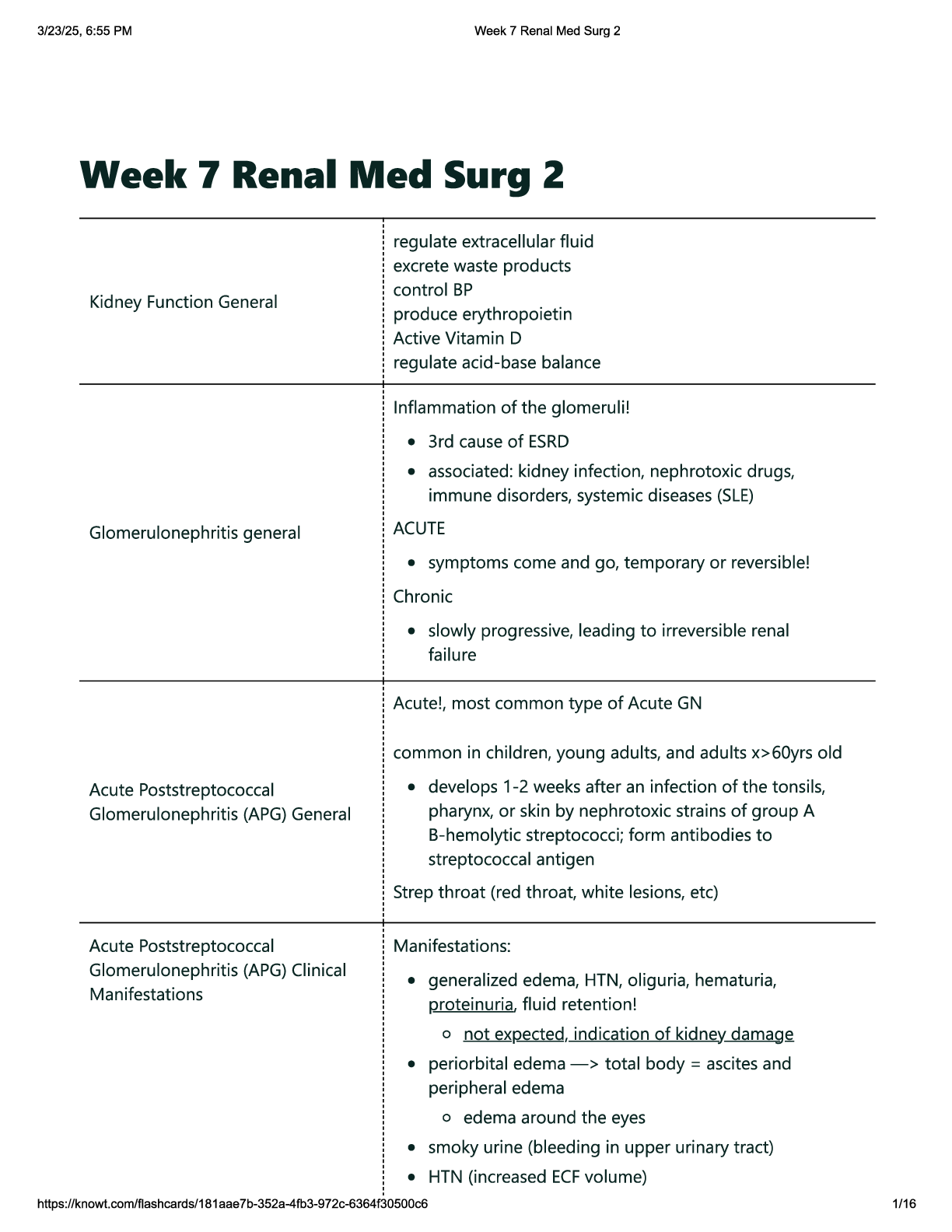
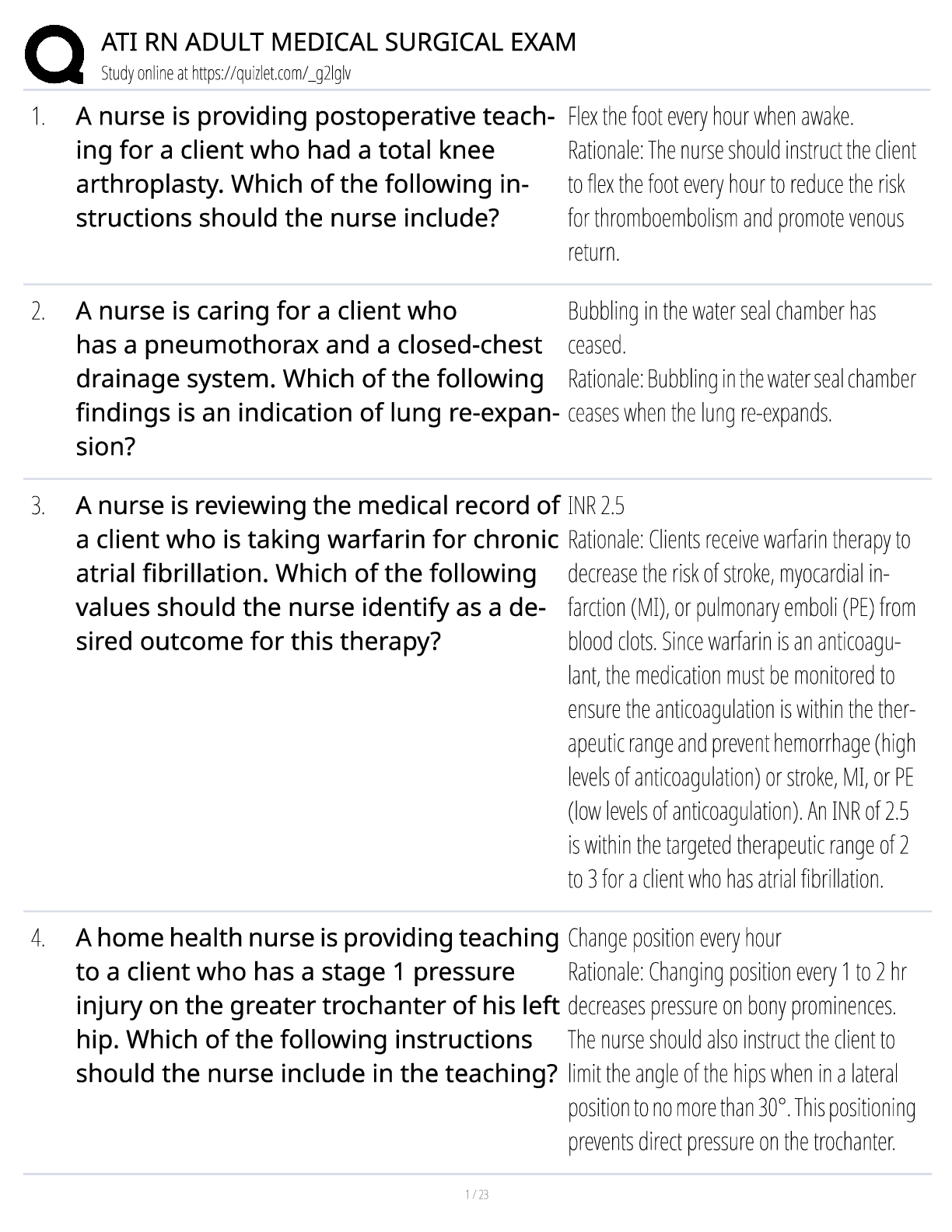
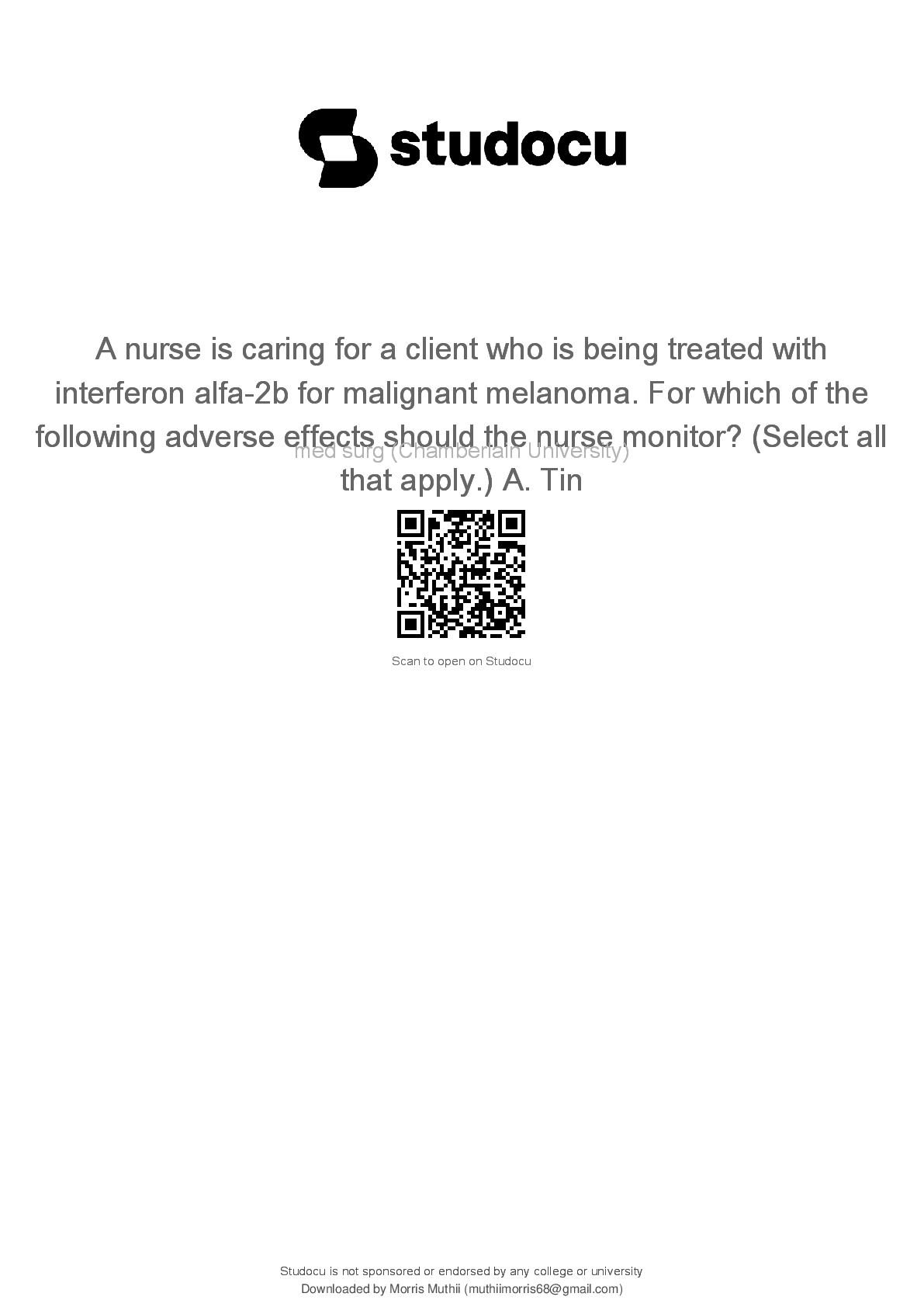
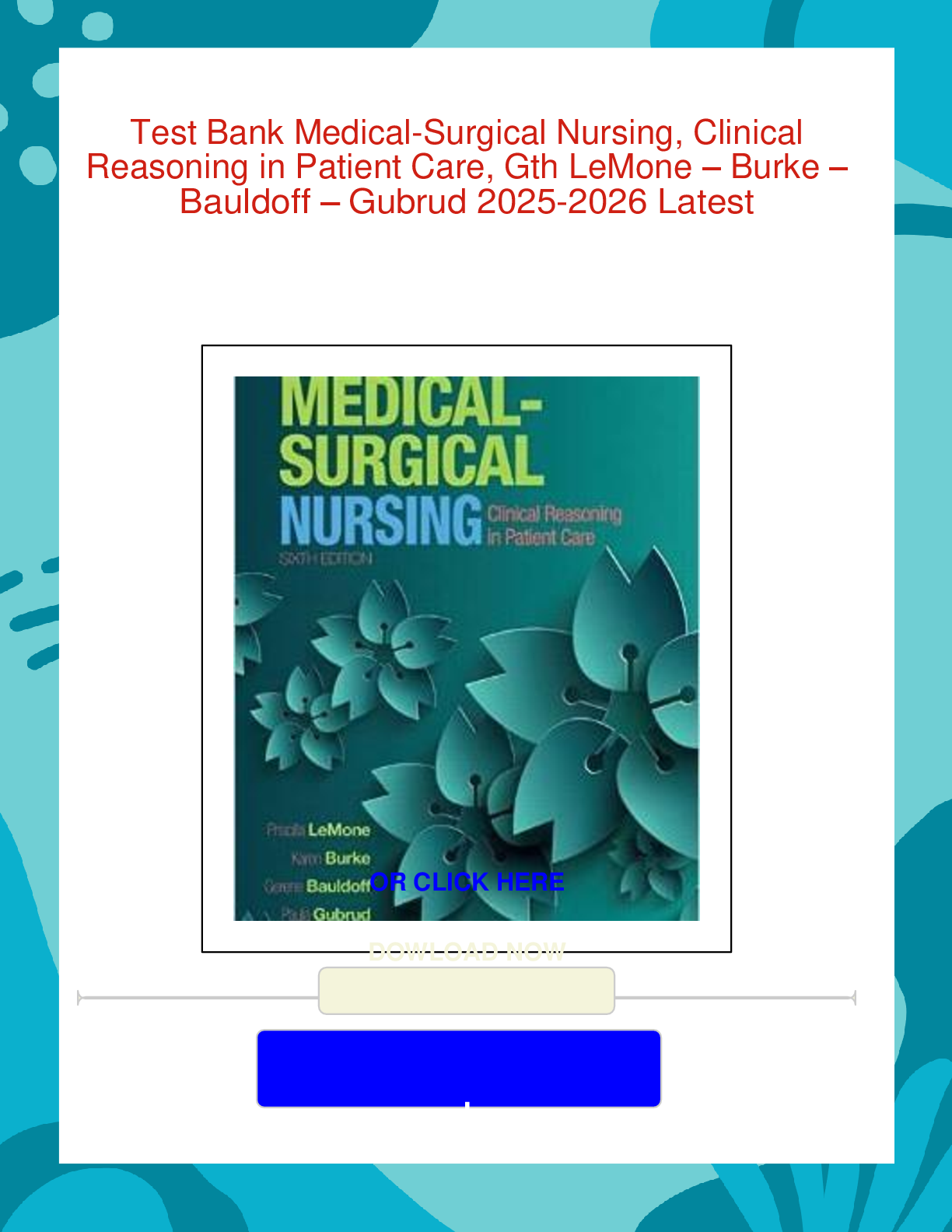
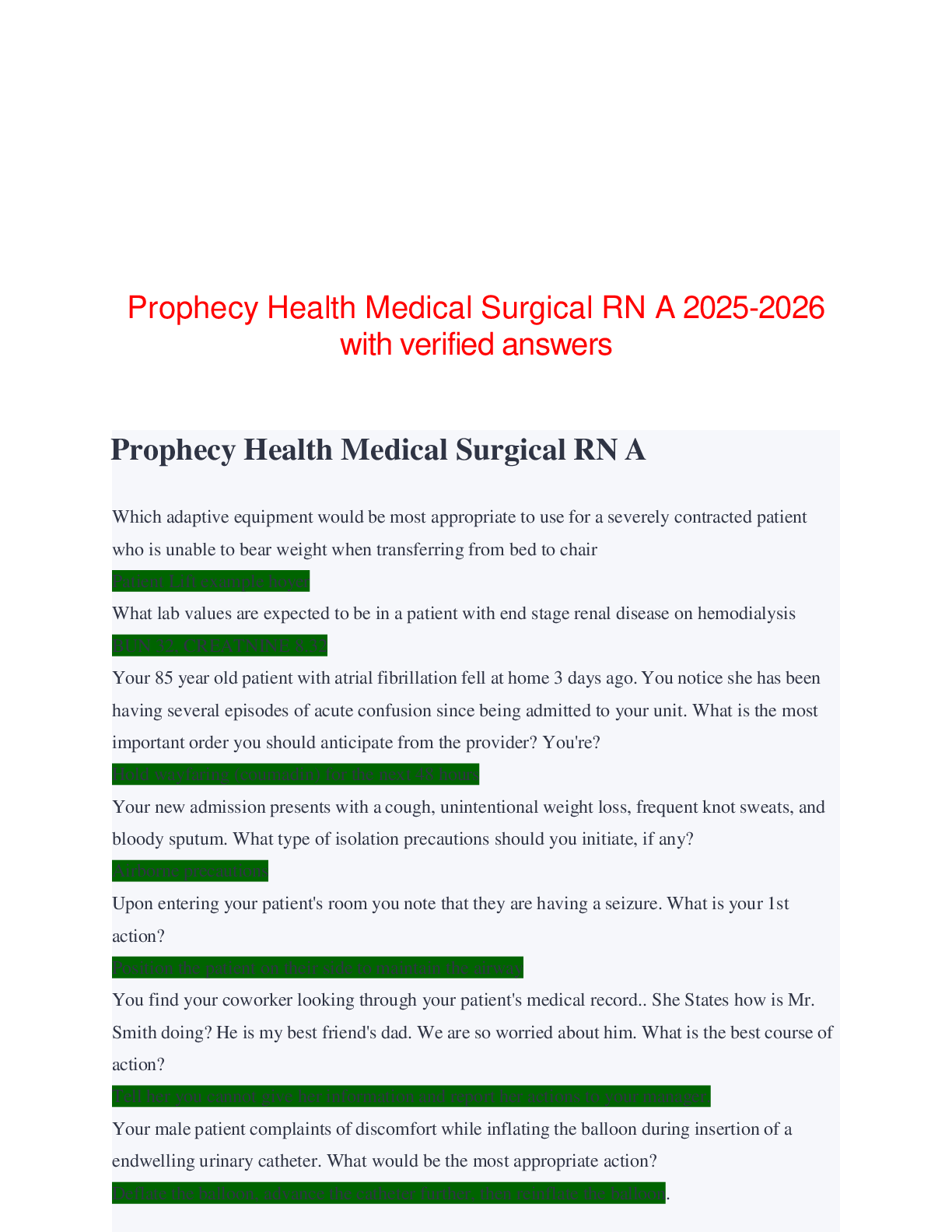
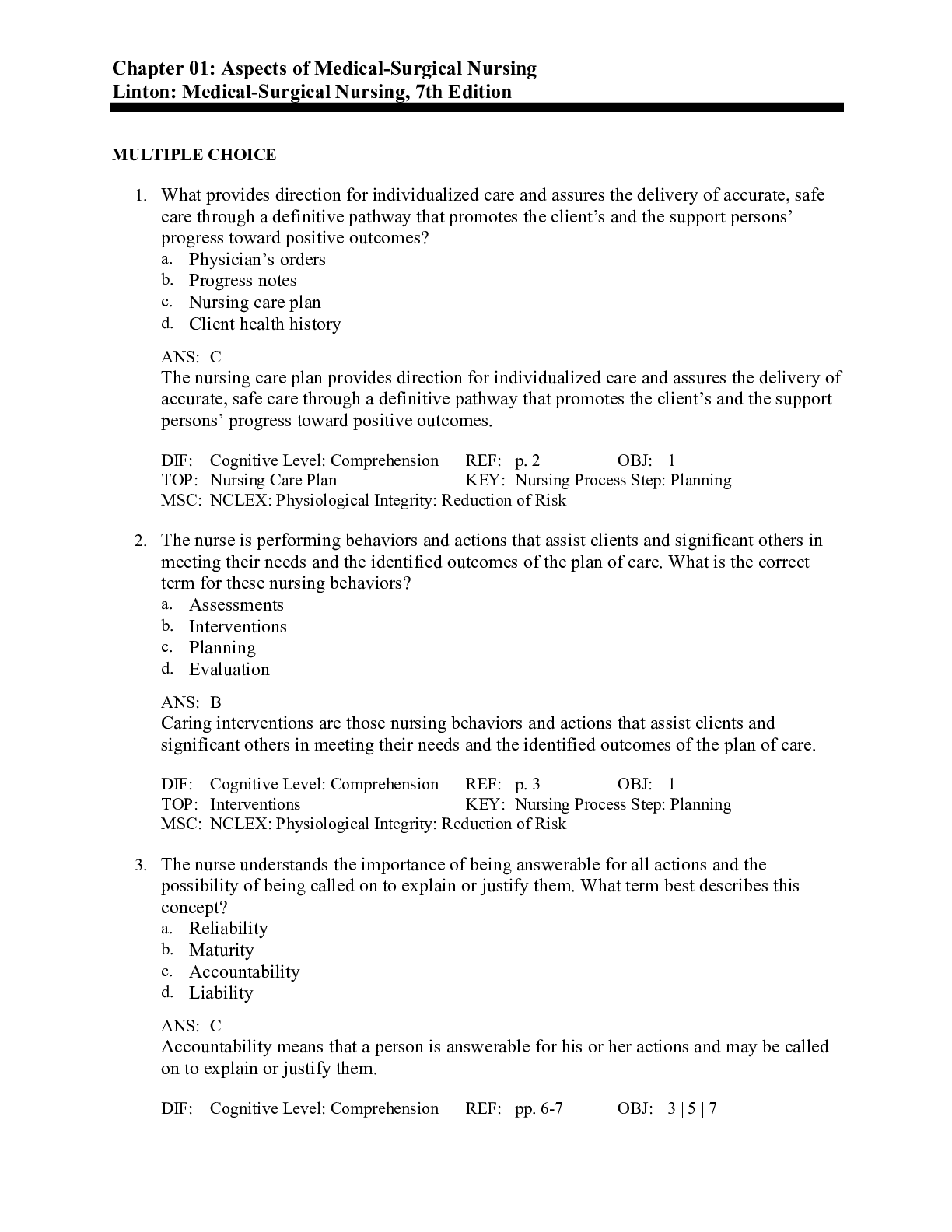

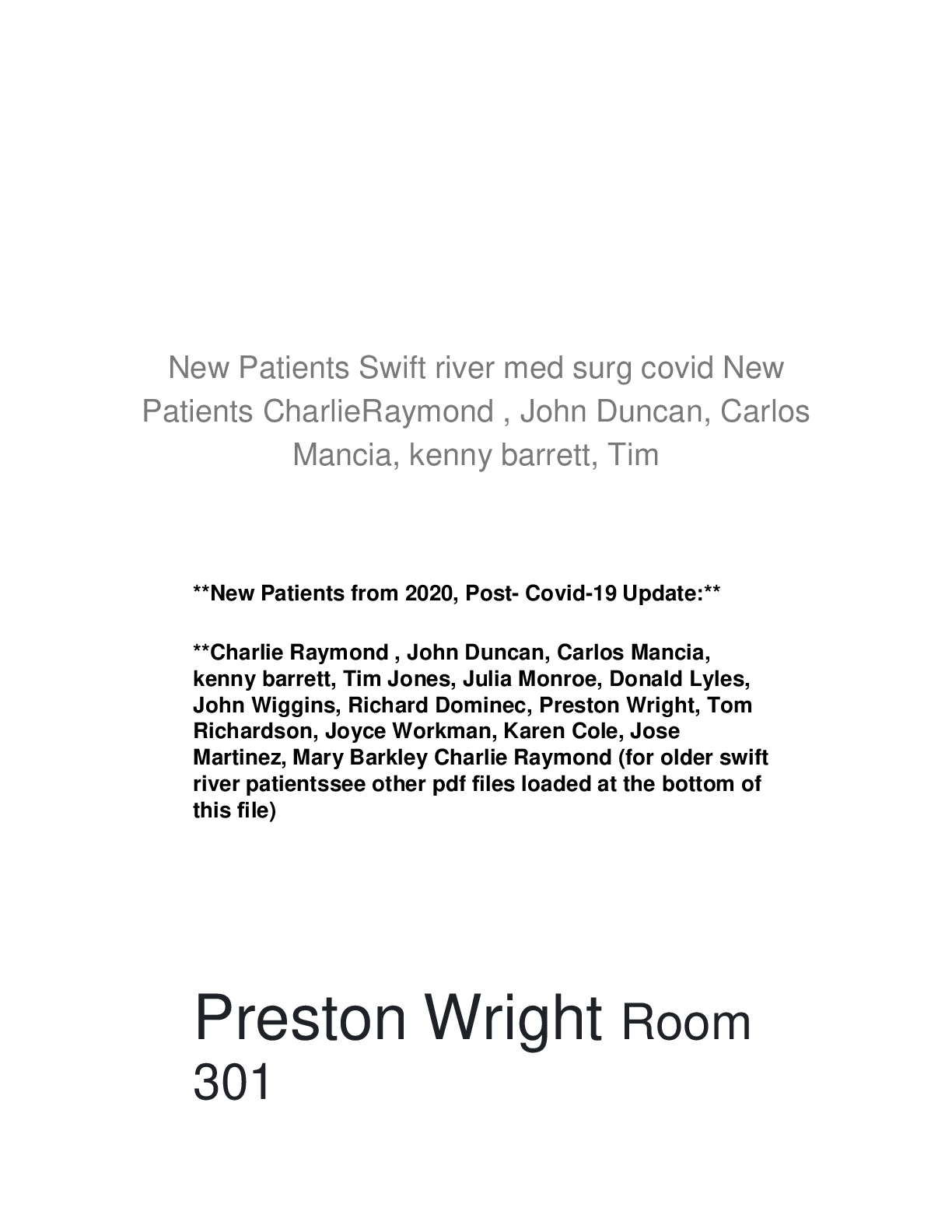

.png)





